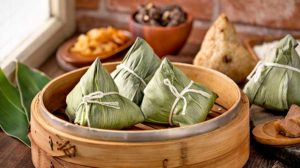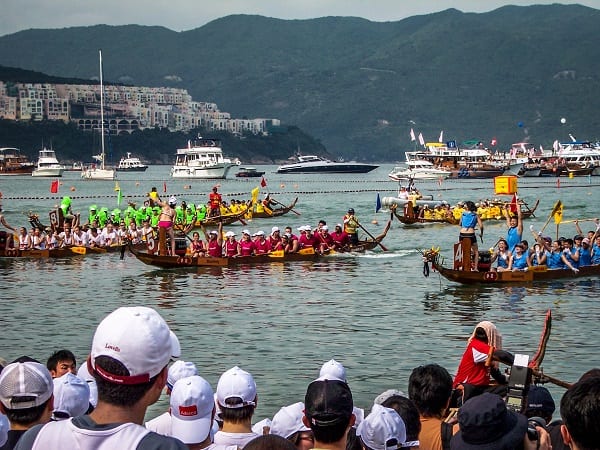Ready to start teaching English online?
Teach with VIPKidThe Dragon Boat Festival is often held near the start of the summer. Teachers may notice students on the VIPKid platform counting down the day to the popular holiday activity because what kid doesn’t get giddy about a summer break? Whether it’s for the sport of boat racing to the overload consumption of sticky rice dumplings known as zongzi, students often look forward to the day and would love to share the enthusiasm with their teacher.
The Dragon Boat Festival has been celebrated for over 2000 years and across Asia. Every region has its own way of celebrating the holiday, but there is something common between all celebrations, as you can probably guess it’s the dragon boat racing. Nowadays in China, this three-day festival is celebrated on the fifth day of the fifth month in the lunar year. Here’s what to know and a quick history of the Dragon Boat Festival!
How do people celebrate?

Zongzi
Different parts of China have special foods and drinks that are unique to the Dragon Boat Festival. However, zongzi is one dish that you will probably find throughout the country. Zongzi is sticky or glutinous rice dumplings that are wrapped in lotus or bamboo leaves. As mentioned before, it is believed that people eat zongzi to remember Qu Yuan and honor his dedication to his country. There are multiple variations for the dumpling fillings, but they are typically either sweet or savory. For example, in Guangdong, their sweet dumplings will have walnuts, dates, or sweet bean fillings and their savory dumplings will have eggs, meat, or roasted chicken.

The Dragon Boat races
Last, but certainly not least, is the tradition of dragon boat races. Originating and taking place mainly in southern China, the dragon boat races have been held for over 2000 years. The wooden boats are sculpted and painted in the bright colors of the mythical creature and can be up to 35 meters or 115 feet in length. Depending on the length, the number of people who paddle and power the boat forward can be between 30-60 people. At the head of the boat is a drummer, who sets the pace and helps the team paddle in a synchronized fashion. Dragon boat racing has even become a competitive sport in many cities and families and tourists alike will go out to watch the races.
Origins and Superstition
Interestingly, there isn’t just one origin story for the Dragon Boat Festival. There are actually three origin stories and each one is dedicated to a particular figure in Chinese history and legend.
Qu Yuan
Qu Yuan was a poet and official for the state of Chu during the Zhou dynasty. He was loyal to the King of Chu and served in high offices, but was wrongly accused of treason and then exiled. During his exile, Qu wrote some of the important poetry in China’s history. But he was overcome with grief when news broke that rival Qin state conquered the capital of Chu and committed suicide by throwing himself into a river. Legend has it that the villagers were so distraught by his suicide that they rushed to find his body in the river but to no avail. In an effort to preserve his body, they slapped their boat paddles against the water to scare away evil spirits and threw rice into the water so that the fish would eat the rice instead of Qu’s body. This is what many think inspired the dragon boat races and the eating of zongzi or sticky rice dumplings. Qu Yuan’s story is the most commonly held origin story for the festival.
Wu Zixu
Wu Zixu lived before Qu Yuan and served the king of Wu. Originally from Chu, Wu fled to the state of Wu when the king of Chu had Wu’s father and brother executed. Wu had his revenge when he helped the king of Wu conquer the state of Chu. But when the king of Wu died and his son came to power, Wu became worried about the threat of the Yue state and advised the new king to conquer Yue. But the new king chose not to listen to Wu and was angered by Wu’s counsel. So Wu was ordered to commit suicide by the king and his body was thrown into the river on the fifth day of the fifth month of the lunar year. For many in China, the festival is dedicated to Wu Zixu, to remember his loyalty to the state of Wu.
Cao E
Cao E was a young girl who lived with her father in a small village. Although the details of the story vary, the main thread through all is that Cao E’s father fell into a river and never returned home. So Cao E walked along the river day and night, calling out her father’s name and scanning the water for his body. Then, on the fifth day of the fifth month of the lunar year, Cao E went into the river. Days later, villagers found the bodies of Cao E and her father together. Cao E is remembered for her filial piety and the festival is dedicated to her sacrifice.
Superstition
It was long thought in China that illnesses, bad luck, and disasters originate during the fifth month of the lunar year. Although it’s becoming less common, many of the customs throughout the country are done to ward off diseases, dangerous bugs and animals, and bad luck. For example, many people consumed realgar wine during the Dragon Boat Festival because it was believed to have medicinal benefits. Though, it’s practiced less because of potential toxicity to the body. On the other hand, people hang calamus and wormwood leaves on doors and windows to repel insects and believe these plants also ward off evil. These are just two examples of how people celebrate! There is an abundance of traditions for the Dragon Boat Festivals and it varies with each region.
Be sure to ask your students how they celebrated the Dragon Boat Festival and what their favorite part of the celebration is!
Originally published June 4, 2019, updated June 9, 2020


